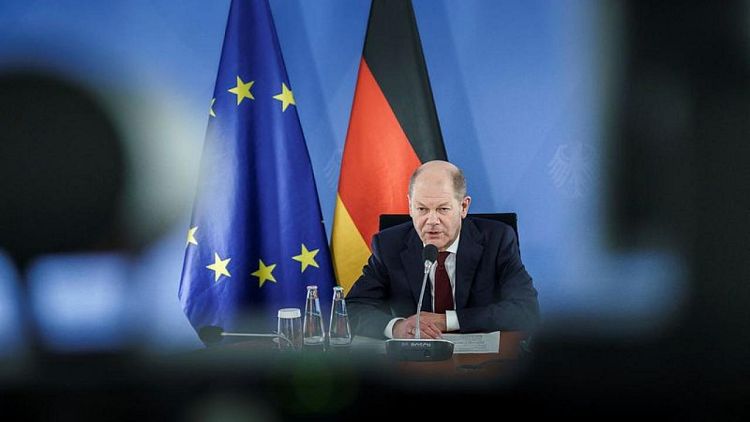By Matthias Williams and Sarah Marsh
KYIV/BERLIN - So grateful were Ukrainians for British military aid arriving last week that "God Save the Queen" was trending on Twitter, while one winery in western Ukraine offered free drinks to British nationals.
But Ukrainians, facing what they fear is a threat of a Russian invasion, are showing less faith in support from a nearer and bigger friend - Germany, where a new coalition government has given signals that are decidedly mixed.
Berlin has refused to sell weapons to Ukraine and has pushed to open a new pipeline for Russian gas that would circumvent Ukraine and deprive it of sorely needed transit fees.
When Germany's navy chief, Kay-Achim Schoenbach, said last week that Russian President Vladimir Putin deserved respect and that trying to win back Crimea, annexed by Russia in 2014, was a lost cause, he resigned.
But those unguarded comments made some Ukrainians question whether Germany can be trusted to help protect them. Ukraine's ambassador to Berlin to decried "German Arrogance & Megalomania" while Foreign Minister Dmytro Kuleba said Germany's actions were encouraging Putin to attack.
"So the question arises: on whose side is the German government today? On the side of freedom, which means - Ukraine? Or on the side of the aggressor?" Kyiv mayor Vitali Klitschko, a former world heavyweight boxing champion who lived for years in Germany, wrote this week on Facebook.
Germany, along with France, is the co-sponsor of peace talks between Ukraine and Russian-backed forces fighting a separatist conflict in eastern Ukraine since 2014.
But Germany also has the closest economic ties to Moscow of any major Western power, buying half its natural gas from Russia. That has long given Berlin a strong incentive to keep relations with Moscow smooth.
And Germans, with a deep history of pacifism since World War Two, are far less likely to support a tough military approach than their British, French or American peers.
NEW CHANCELLOR
The crisis poses the first big foreign policy test for Chancellor Olaf Scholz, who took office last year after 16 years of leadership by Angela Merkel, and who faces division within his coalition over how to respond to Russian pressure.
Merkel, a centre-right politician from Germany's former Communist east, was known for a firm but pragmatic approach to Russia, often taking a tough line politically on human rights and Ukraine, while clearing the way for gas pipelines.
Scholz's centre-left SPD has a history of promoting closer ties with Russia, including business ties: the last SPD chancellor, Gerhard Schroeder, jumped straight from politics into a career as a lobbyist for Russian energy companies. He is now board chairman of Russian oil company Rosneft.
Scholz's Green and liberal junior coalition partners have a record of favouring harder lines, but the coalition has had to smooth over any differences in public.
'EVIL, BUT ALSO USELESS'
Ordinary Germans are almost twice as likely as Americans to want greater collaboration with Russia, according to a Pew poll from 2020. Another poll published last month by Civey found that more than half of East Germans and 35% of West Germans favour a collaborative approach, while only 22% of Germans favoured a confrontational approach.
"It's not just Russia specific - a lot has to do with how Germans perceive military power to be not just evil but also useless," said Marcel Dirsus, Non-Resident Fellow at the Institute for Security Policy at Kiel University. "And many believe a lot of recent western military action has been a failure that has produced disastrous consequences."
As she strolled down Karl Marx Allee in Berlin, retired East German accountant Christina Mahler, 84, said she agreed with the remarks by the ousted navy chief that Russia's views were important.
"We need Russia and we shouldn't be provoking it like we are," she said. "We sparked two world wars - we shouldn't deliver weapons to anyone. I lived through one of them, I know what I'm talking about."
When Russia annexed Ukraine's Crimea Peninsula in 2014, Merkel supported sanctions on Moscow and disbursed aid to Kyiv. But Germany has largely ignored Kyiv's pleas to scrap Nord Stream 2.
Last year, Germany struck a deal with the United States paving the way for the pipeline to reopen. And Berlin has pushed back against some tougher sanctions proposals, including disconnecting Russia from the SWIFT payments system.
"Germany does this in the first place for its own sake," said Victor, a 26-year-old Kyiv resident.
"Apparently, Germany thinks it is better for them this way. Apparently, Russia is a bigger and better ally to them than we are. One has to see it from (Germany's) perspective."
